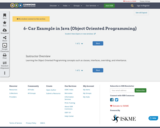
Learning the Object Oriented Programming concepts such as classes, interfaces, overriding, and inheritance.
- Subject:
- Computer Science
- Material Type:
- Full Course
- Author:
- Saeid Samadidana
- Date Added:
- 08/30/2022

Learning the Object Oriented Programming concepts such as classes, interfaces, overriding, and inheritance.

The course aims at providing the fundamental tools for effective C++ programming in the context of high-performance computing. The tools include generic programming techniques, API development, and specific C++-11/14/17 constructs. Starting from a basic knowledge of C++, the attendees should be able to start using C++ language to engineer durable abstractions to develop and optimize applications. Example usage of modern C++ concepts and features are taken from scientific applications used by the HPC community, giving the attendees the opportunity to see the presented tools in action in real world cases. Exercises are provided from a GitHub repository. This material is meant to reflect the current state of the current C++ standard. As the standard changes, some aspects of this course may become outdated.This course is an integral part of the ESiWACE-2 project, and we acknowledge the partial funding from that project. The contact person is william.sawyer@cscs.ch.
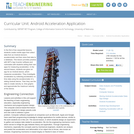
In the first of two sequential lessons, students create mobile apps that collect data from an Android device's accelerometer and then store that data to a database. This lesson provides practice with MIT's App Inventor software and culminates with students writing their own apps for measuring acceleration. In the second lesson, students are given an app for an Android device, which measures acceleration. They investigate acceleration by collecting acceleration vs. time data using the accelerometer of a sliding Android device. Then they use the data to create velocity vs. time graphs and approximate the maximum velocity of the device.
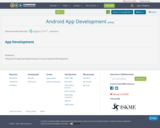
Using the Google developed lessons to learn Android Development.
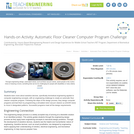
Students learn more about assistive devices, specifically biomedical engineering applied to computer engineering concepts, with an engineering challenge to create an automatic floor cleaner computer program. Following the steps of the design process, they design computer programs and test them by programming a simulated robot vacuum cleaner (a LEGO® robot) to move in designated patterns. Successful programs meet all the design requirements.

This course is conducted as an artificial intelligence programming contest in Java. Students work in teams to program virtual robots to play Battlecode, a real-time strategy game. Optional lectures are provided on topics and programming practices relevant to the game, and students learn and improve their programming skills experientially. The competition culminates in a live Battlecode tournament.
This course is offered during the Independent Activities Period (IAP), which is a special 4-week term at MIT that runs from the first week of January until the end of the month.

Blueprints is a concise yet comprehensive coverage of Object-Oriented Analysis and Design concepts, suitable for a second programming course in Computer Science. It introduces and teaches application development in a command-line environment, and assumes basic expertise with the Java programming language.

This course will serve as a two-week aggressively gentle introduction to programming for those students who lack background in the field. Specifically targeted at students with little or no programming experience, the course seeks to reach students who intend to take 6.001 and feel they would struggle because they lack the necessary background. The main focus of the subject will be acquiring programming experience: instruction in programming fundamentals coupled with lots of practice problems. Lots of programming required, but lots of support provided.
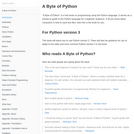
"A Byte of Python" is a free book on programming using the Python language. It serves as a tutorial or guide to the Python language for a beginner audience. If all you know about computers is how to save text files, then this is the book for you. There are many translations of the book available in different human languages.
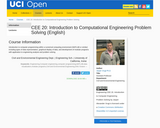
Introduction to computer programming within a numerical computing environment (MATLAB or similar) including types of data representation, graphical display of data, and development of modular programs with application to engineering analysis and problem solving.
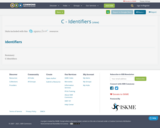
C Identifiers
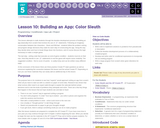
This lesson attempts to walk students through the iterative development process of building an app (basically) from scratch that involves the use of `if` statements. Following an imaginary conversation between two characters - Alexis and Michael - students follow the problem solving and program design decisions they make for each step of constructing the app. Along the way they decide when and how to break things down into functions, and of course discuss the logic necessary to make a simple game.
The last step - writing code that executes an end-of-game condition - students must do on their own. How they decide to use `if` statements to end the game will require some creativity. The suggested condition - first to score 10 points - is subtly tricky and can be written many different ways.
At the conclusion of the lesson there are three practice Create PT-style questions as well as resources explaining the connection between this lesson and the actual Create PT. Depending on how you use these materials they can easily add an additional day to this lesson.
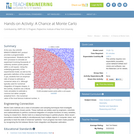
At its core, the LEGO MINDSTORMS(TM) NXT product provides a programmable microprocessor. Students use the NXT processor to simulate an experiment involving thousands of uniformly random points placed within a unit square. Using the underlying geometry of the experimental model, as well as the geometric definition of the constant π (pi), students form an empirical ratio of areas to estimate a numerical value of π. Although typically used for numerical integration of irregular shapes, in this activity, students use a Monte Carlo simulation to estimate a common but rather complex analytical form the numerical value of the most famous irrational number, π.
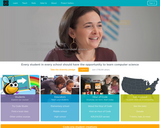
Every student in every school should have the opportunity to learn computer science. Teach students to code. Hour of Code resources

This course introduces architecture of digital systems, emphasizing structural principles common to a wide range of technologies. It covers the topics including multilevel implementation strategies, definition of new primitives (e.g., gates, instructions, procedures, processes) and their mechanization using lower-level elements. It also includes analysis of potential concurrency, precedence constraints and performance measures, pipelined and multidimensional systems, instruction set design issues and architectural support for contemporary software structures.

6.004 offers an introduction to the engineering of digital systems. Starting with MOS transistors, the course develops a series of building blocks — logic gates, combinational and sequential circuits, finite-state machines, computers and finally complete systems. Both hardware and software mechanisms are explored through a series of design examples.
6.004 is required material for any EECS undergraduate who wants to understand (and ultimately design) digital systems. A good grasp of the material is essential for later courses in digital design, computer architecture and systems. The problem sets and lab exercises are intended to give students "hands-on" experience in designing digital systems; each student completes a gate-level design for a reduced instruction set computer (RISC) processor during the semester.

16.225 is a graduate level course on Computational Mechanics of Materials. The primary focus of this course is on the teaching of state-of-the-art numerical methods for the analysis of the nonlinear continuum response of materials. The range of material behavior considered in this course includes: linear and finite deformation elasticity, inelasticity and dynamics. Numerical formulation and algorithms include: variational formulation and variational constitutive updates, finite element discretization, error estimation, constrained problems, time integration algorithms and convergence analysis. There is a strong emphasis on the (parallel) computer implementation of algorithms in programming assignments. The application to real engineering applications and problems in engineering science is stressed throughout the course.
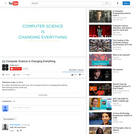
Students will recognize that computer science is so important because it can be found in almost every career. Don't wait, start learning how to code today.
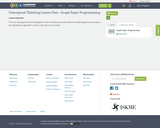
This is an amazing lesson for third graders! It has an interaction portion where the students get to work hands on learning what an algorithm is, how to code, and so much more1
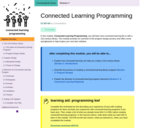
In this module, Connected Learning Programming, you will learn how connected learning fits in with a 21st century library. This module provides an overview of the program design process and offers some springboards to help inspire your next teen initiative.